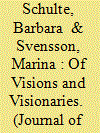|
|
|
Sort Order |
|
|
|
Items / Page
|
|
|
|
|
|
|
| Srl | Item |
| 1 |
ID:
178315


|
|
|
|
|
| Summary/Abstract |
This article analyses the visions, careers, and companies of Jack Ma of Alibaba and Geng Le of Blue City. Jack Ma is a well-known business leader and visionary, whereas the less well-known Geng Le only began to receive more attention since launching a successful gay dating app in 2012. The article focuses on the personal narratives and visions of these two IT entrepreneurs. It provides new perspectives on the role of individual entrepreneurs in relation to the Chinese state’s global ambitions and vision of creating a “strong internet country.” It argues that the commercialisation and platformisation of the Chinese internet, and the growing transnational nature of Chinese IT companies, serve to make them more, not less, co-dependent of the state and its visions. The internet’s emancipatory potential is today increasingly conflated with consumption, and online spaces and social relations are subject to both commodification and datafication.
|
|
|
|
|
|
|
|
|
|
|
|
|
|
|
|
| 2 |
ID:
178314


|
|
|
|
|
| Summary/Abstract |
Why do Chinese governments at various levels set up public complaint websites where citizen petitions and government responses can be reviewed by the general public? We argue that it is the result of two factors: strong signals sent by the central government to improve governance, and the availability of new technologies to promote policy innovation. To impress their superiors, local officials adopted newly available commercial technology to innovate existing citizen feedback systems, which presented a developmental trajectory from “openness,” “integration,” to “big data-driven prediction.” Drawing on policy documents and interviews with local politicians and administrators, we provide a chronological perspective of how technical development, central government’s signals and local decision-making have interacted in the past two decades to bring forth today’s public complaint websites. The contingent and non-teleological nature of this development can also be applied to other policies such as the social credit system.
|
|
|
|
|
|
|
|
|
|
|
|
|
|
|
|
| 3 |
ID:
178311


|
|
|
|
|
| Summary/Abstract |
This special issue approaches information and communication technologies (ICT) visions and their realisation/implementation at various levels, among different actors and from various perspectives. Conceptually, we distinguish three different dimensions, even though those overlap in the individual contributions as well as in empirical reality – namely ideational, instrumental, and relational. The different contributions address both visions formulated by the Chinese state and by individual actors such as entrepreneurs. Even though the conditions for the use of ICT in China are deeply affected by state governance, this governance is in no way tantamount to one single government. As this issue’s contributions show, state attempts at building a stable cyber-governance are in need of allies and, depending on the allies’ visions and other, competitive visions, the outcomes of these dynamics are seldom truthful realisations of one original grand masterplan.
|
|
|
|
|
|
|
|
|
|
|
|
|
|
|
|
| 4 |
ID:
178317


|
|
|
|
|
| Summary/Abstract |
This article addresses issues surrounding the social construction of internet addiction, focusing on conceptualisations of reality, escape, hope, and time. Drawing on a critical realist account of semiosis, the framing of internet addiction in China is analysed using the documentary film Web Junkie as an empirical pivot and point of departure. A contextual overview of relations, interests, and tensions surrounding youth and the internet in China is provided, and the film Web Junkie is briefly presented. The main body of the article consists of a critical analysis of conceptualisations of “reality” and “escape.” The core tension focused on in the analysis is the struggle over time, necessitating engagement with critical thought on hope and utopia. The analysis concludes that struggles over temporal autonomy underlie conflicting claims about “reality” and “escape” that are central to “internet addiction” and its treatment in China today.
|
|
|
|
|
|
|
|
|
|
|
|
|
|
|
|
| 5 |
ID:
178313


|
|
|
|
|
| Summary/Abstract |
This study seeks to explain how Chinese state media bolster the use of visions in global internet governance. The empirical data for the article consist of 1,158 internet-related articles published in the Global Times between 2009 and 2018. I develop a theoretical perspective that distinguishes between grand and strategic narratives. Based on a mixed-methods approach, I show that “internet sovereignty” has qualified as a grand narrative since the second half of 2013. State media facilitate this shift with strategic narratives that push the content and context of “internet sovereignty” from domestic political rationales towards a matter of global affairs. The article contributes to theoretical and methodological advancement in textual analysis.
|
|
|
|
|
|
|
|
|
|
|
|
|
|
|
|
|
|
|
|
|